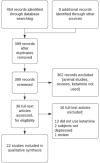Strategies to Prolong Ketamine's Efficacy in Adults with Treatment-Resistant Depression
- PMID: 33929660
- PMCID: PMC8189962
- DOI: 10.1007/s12325-021-01732-8
Strategies to Prolong Ketamine's Efficacy in Adults with Treatment-Resistant Depression
Abstract
Introduction: Ketamine treatment is capable of significant and rapid symptom improvement in adults with treatment-resistant depression (TRD). A limitation of ketamine treatment in TRD is the relatively short duration of time to relapse (e.g., median 2-4 weeks). The objective of the systematic review herein is to identify strategies capable of prolonging the acute efficacy of ketamine in adults with TRD.
Methods: PubMed/MEDLINE databases were searched from inception to December 2020 for clinical studies written in English using the following key terms: ketamine, prolong, and depression. A total of 454 articles were identified from the literature search which included all clinical studies regarding prolonging the antidepressant effects of ketamine. Twenty-two articles were included: ten randomized controlled trials (RCTs), eight prospective open-label trials, one retrospective chart review, and three case reports. The Preferred Reporting Items for Systematic Reviews and Meta-Analyses (PRISMA) guidelines were used for data extraction. The primary outcome was prolonged effect, defined as statistically significant antidepressant effects following acute ketamine treatment.
Results: A total of 454 articles were identified, and 22 articles were included. Different treatment modalites including pharmacological interventions, manualized-based psychotherapies, electroconvulsive therapy, transcranial magnetic stimulation, and intravenous monotherapy were examined to determine their impact on the prolongation of antidepressant effects following acute ketamine treatment. No treatment modality, other than repeat-dose IV ketamine, has demonstrated ability to significantly prolong the acute efficacy of IV ketamine in TRD.
Conclusion: Hitherto, available open-label data and controlled trial data support repeat administration of IV ketamine as an effective strategy to prolong the efficacy of ketamine's antidepressant effects (although not the focus of the study herein, maintenance repeat-dose esketamine treatment is proven effective in esketamine responders). There is a need to identify multimodality strategies that are safe and capable of prolonging the efficacy of ketamine in adults with TRD.
Keywords: Anxiety; Bipolar disorder; Depression; Esketamine; Ketamine; Major depressive disorder; Suicidality; Treatment-resistant depression.
Figures
References
Publication types
MeSH terms
Substances
LinkOut - more resources
Full Text Sources
Other Literature Sources
Medical


